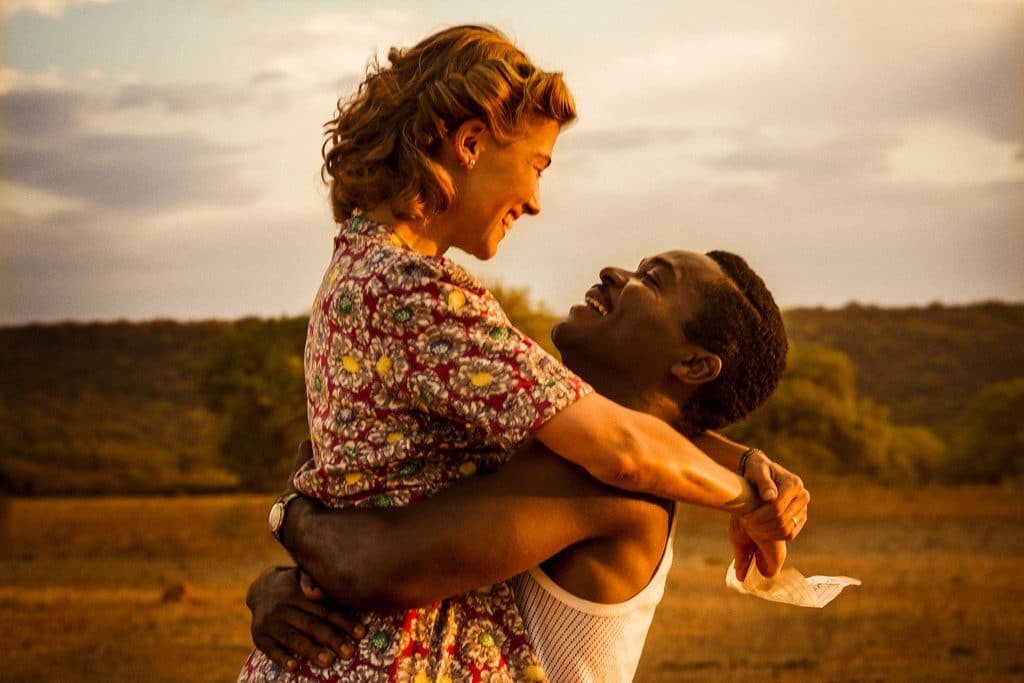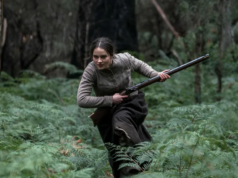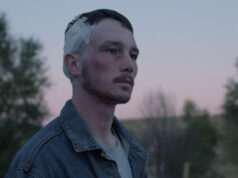Despite its great performances and the relevance of the story it wants to tell, A United Kingdom is perhaps a bit too conventional to be memorable
A United Kingdom (2016)
Directed by Amma Asante. Screenplay by Guy Hibbert, based on “Colour Bar” by Susan Williams. Starring David Oyelowo, Rosamund Pike, Tom Felton, Terry Pheto, Vusi Kunene, Abena Ayivor, Jack Davenport, Jack Lowden, Donald Molosi, Charlotte Hope, Nicholas Lyndhurst, Anastasia Hille, Laura Carmichael and Jessica Oyelowo.
A United Kingdom is only one of two films released in 2016 dealing with interracial marriage. But while Jeff Nichols’ Loving deserves praise for its honest, unsentimental approach to telling a true-life story — thus moving us precisely for understanding that there is no need to dramatize events that are powerful by themselves — Amma Asante makes a film (also based on a true story) that feels a lot more conventional and consequently less memorable. That, in fact, is a real pity considering what the director wants to tell, especially with regard to the political agenda of a few governments that want to prevent two people from marrying (and later sabotage their union) since said marriage would represent an affront to their diplomatic interests.
Written by Guy Hibbert and based on Susan Williams’ book Colour Bar (which I’ve never read), A United Kingdom begins in 1947 London, when law student Seretse Khama (David Oyelowo), heir to the throne of Bechuanaland (now the Republic of Botswana in Africa), meets and falls in love with Ruth Williams (Rosamund Pike), a white English woman. Interracial marriage is definitely not seen with good eyes, and when the two finally marry (despite protests of their families), they realize they also need to fight the relentless opposition of a British government that is only concerned about maintaining their diplomatic relations with South Africa (under apartheid domination) and protecting the stability of their protectorate in Southern Africa.
Also responsible for another film that deals with racial issues in a political context (the genuinely moving Belle), Asante knows how to tackle certain political matters, like the abuse of British imperialism and the cunning strategy used by British officials to keep Seretse away from Ruth — including banishing him from his own country at a certain point. Thus, the most interesting aspect of A United Kingdom is the candid way it approaches the exploitation of resources in African countries by the British (including their authorization of US drillings in Bechuanaland for diamonds and minerals) and how these same people could come up with any dirty move to prevent two human beings who love each other from being together.
Carrying the movie on their shoulders, Oyelowo (Selma) and Pike (Gone Girl) are excellent and have great chemistry together, which compensates for the clichés in the characterization of some other characters — such as Ruth’s one-dimensionally racist father who “understands” her sister wanting to spend time with colored people because “at least [she] wants to convert them.” Likewise, the only two white women who try to get close to Ruth in Bechuanaland look more like Cinderella’s stepsisters, while the film’s initial attempt to humanize a figure like Sir Alistair Canning (Jack Davenport) by showing us a photo of his wife in his office just falls flat — and I won’t even go into his artificial behavior and lame stuttering in the end.
More clichéd, though, are lines such as “You are the only one I want to spend my life with,” which would be more appropriate in a soap opera. Besides, by trying hard to move us with big words, the film gives us two speeches that are intended to be key moments but simply fail to deliver. In the first, Seretse addresses his people in English (don’t ask me why) and is followed by a silence broken only by the sound of a fly, before each person in the audience begins to raise their own hands, one by one, in defense of their prince (hell, this is so old). The other is a typically hopeful speech at the end about the importance and necessity of democracy — which is only as clichéd as a freeze frame in the last shot followed by photos of the real people portrayed in the film.
But although Asante’s approach to her material is mostly uninspired, it is sometimes effective, like with newspapers headlines that pop up on screen in the old-fashioned way, or the contrast between Seretse’s popularity as he gives a major speech in London (yes, this film is full of declamations) and the British’s unpopularity in Bechuanaland, when no one shows up to hear what they have to say. At least, A United Kingdom compensates for its sober aesthetics with the stunning landscapes of Botswana and a lot of respect for the Bangwato tribe. That will be enough to leave me thinking for a while about going on a trip there any time soon.





